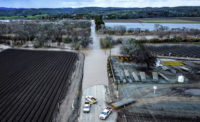Canal Work Won't Shut Down, But Cost Battle Continues

The Jan. 20 deadline for a work stoppage on the $5.2-billion Panama Canal expansion came and went without any halt to project activity, but the crisis over an alleged $1.6 billion in cost overruns remains unsettled and has slowed progress.
Contractor Grupo Unidos Por el Canal (GUPC) now proposes that it and owner Panama Canal Authority "co-finance" the disputed costs, until their responsibility is decided by international arbitrators.
In its Jan. 20 statement, GUPC provides no details on the cost-sharing plan but says it would cover "unexpected" expenses that will keep the project's 10,000-person workforce employed and allow the huge job to reach a promised completion in the first half of 2015.
The statement says the contractor would "extend the notice given to a possible suspension of work," with a new Jan. 31 deadline set, an ACP spokesperson confirmed on Jan. 21.
Under the new plan, "the resources financed by the [authority] are fully covered by bank guarantees and insurance obtained by the consortium," pending the arbitrators' decison on responsibility for the extra costs, says GUPC.
It contends that work is costing $100 million per month.
"There is no question about the existence of these unexpected costs, but only about who should pay for them—the contractor or the client," says the GUPC statement.
An ACP spokeswoman said late on Jan. 20 that the owner had not been formally presented with the proposal, but that "it is not possible to have agreements outside of the terms of the contract."
ACP has said that the contractor group must abide by its contractual three-step dispute-settlement process.
Following an inspection of locks construction on the canal's Pacific side, ACP contends that site activity has fallen from 25% to one-third below its regular level, and possibly as much as 40% in recent weeks.
GUPC, composed of Spain’s Sacyr Vallehermoso S.A., Italy’s Impregilo S.p.A., the Netherlands' Jan De Nul n.v. and Constructora Urbana, S.A. of Panama, won the design-build contract for the locks work in July 2009.
The contractor's $3.12-billion bid was the only one below the ACP's allocated cost of $3.48 billion.
The amount bested the next lowest bid by a partnership between Bechtel and Taisei Mitsubishi by more than $1 billion.
In its statement, GUPC says that the project is 70% complete "and technically speaking, nothing prevents us from reaching the finishing line."
According to the contractor, "the only impediment is the difficult financial situation which has arisen due to the additional costs which occurred during the execution of the works, for which [the contractor] has requested relief."
ACP officials began meetings on Jan. 21 with the project's surety company representatives, tp determine the direction of the dispute resolution, including the potential of a contractor change.
Zurich Insurance Group holds approximately $600 million in surety bonds covering the locks project.
A previous meeting, scheduled for Jan. 13, was postponed.
According to ACP, between the bonds and the available cash on hand, there is more than $1.3 billion available to continue work on the project if the contractor cannot complete the work.
ACP Administrator Jorge Quijano has publicly stated in recent days that the authority had reached out to other potential contractors but did not identify them.
The standoff began on Dec. 30, when GUPC notified ACP of the threatened work suspension.
It followed disagreements between the owner and contractor over project issues that include a sharp reduction in contractor personnel, the delivery of completed locks gates, progress in completing three dams under the locks contract and technical data supplied by ACP to GUPC.
ACP had proposed a $283-million joint-financing scheme on Jan. 7 to help the contractor continue work. GUPC initially responded saying at least $400 million was needed, but then upped the figure to $1 billion.






